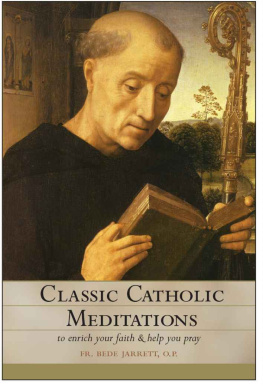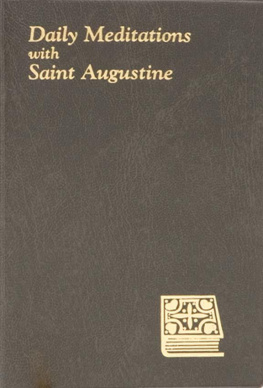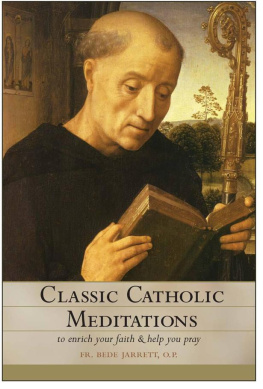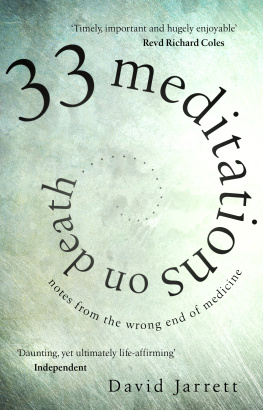Fr. Bede Jarrett - Classic Catholic Meditations
Here you can read online Fr. Bede Jarrett - Classic Catholic Meditations full text of the book (entire story) in english for free. Download pdf and epub, get meaning, cover and reviews about this ebook. year: 2012, publisher: Sophia Institute Press, genre: Religion. Description of the work, (preface) as well as reviews are available. Best literature library LitArk.com created for fans of good reading and offers a wide selection of genres:
Romance novel
Science fiction
Adventure
Detective
Science
History
Home and family
Prose
Art
Politics
Computer
Non-fiction
Religion
Business
Children
Humor
Choose a favorite category and find really read worthwhile books. Enjoy immersion in the world of imagination, feel the emotions of the characters or learn something new for yourself, make an fascinating discovery.
- Book:Classic Catholic Meditations
- Author:
- Publisher:Sophia Institute Press
- Genre:
- Year:2012
- Rating:3 / 5
- Favourites:Add to favourites
- Your mark:
- 60
- 1
- 2
- 3
- 4
- 5
Classic Catholic Meditations: summary, description and annotation
We offer to read an annotation, description, summary or preface (depends on what the author of the book "Classic Catholic Meditations" wrote himself). If you haven't found the necessary information about the book — write in the comments, we will try to find it.
Classic Catholic Meditations — read online for free the complete book (whole text) full work
Below is the text of the book, divided by pages. System saving the place of the last page read, allows you to conveniently read the book "Classic Catholic Meditations" online for free, without having to search again every time where you left off. Put a bookmark, and you can go to the page where you finished reading at any time.
Font size:
Interval:
Bookmark:
Classic Catholic Meditations
To Enrich Your Faith and Help You Pray
Bede Jarrett, O.P.
SOPHIA INSTITUTE PRESS
Manchester, New Hampshire
Classic Catholic Meditations: To Enrich Your Faith and Help You Pray was formerly published as Meditations for Layfolk in 1941 by the Catholic Truth Society, London. This 2004 edition by Sophia Institute Press includes minor editorial revisions to the original text.
Copyright 2004 Sophia Institute Press
All rights reserved
Printed in the United States of America
Cover design by Theodore Schluenderfritz
On the cover: Hans Memlings Saint Benedict, Uffizi, Florence. Photo courtesy of Scala.
No part of this book may be reproduced, stored in a retrieval system, or transmitted in any form, or by any means, electronic, mechanical, photocopying, or otherwise, without the prior written permission of the publisher, except by a reviewer, who may quote brief passages in a review.
Sophia Institute Press
Box 5284, Manchester, NH 03108
1-800-888-9344
www.SophiaInstitute.com
Nihil obstat:
Hugh Pope, O.P., S.T.M., D.S.
Wulstan McCuskern, O.P.
Imprimatur:
Humbert Everest, O.P., S.T.B.
Provincial of English Dominicans
Nihil obstat:
F. Thomas Bergh, O.S.B.
Imprimatur:
Petrus Epus Southwarc
May 5, 1915
[Meditations for layfolk]
Classic Catholic meditations : to enrich your faith and help you pray / Bede Jarrett.
p. cm.1. Meditations. I. Title.
BX2182.3 .J37 2004
242 dc222003024729
Scheme of Meditation
Preparation
Place yourself in Gods presence: Nigh art Thou, O Lord... and all my ways are ever in Thy sight.
Adore God: Thou art great; I am nothing. Thou art good; I am sinful. Thou art light; I am darkness....
Ask for Gods light: Give me light to see Thy holy will and grace to do it. Wisdom of the Sacred Head of Jesus, direct me in all my ways. Light of the Sacred Countenance of Jesus, shine down upon me. Love of the Sacred Heart, consume me in Thy fire.
Hail Mary...
St. Joseph, my angel guardian, my patron saints, pray for me.
Meditation
Read the first point, or read until a thought comes to you that is in some way striking. Then, in your own way, talk to God:
- Make acts of faith, gratitude, humility, hope, love, or sorrow for sin.
- Ask God for light, humility (or some other virtue suggested by your meditation), love, perseverance, and so forth.
- Make resolutions to develop virtues, avoid occasions of sin, overcome defects, bear vexations, and so forth.
Continue for each point you consider, bearing in mind that your object should be, not to read through the whole page, but to pray; stop reading as soon as you have enough to go on with. Continue to pray as long as you find yourself in touch with God.
Conclusion
Thank God for light bestowed.
Resolve to keep your resolutions.
Ask God for the love of Jesus to keep you away from occasions of sin.
Say an Our Father and a Hail Mary for souls in Purgatory, for sinners, for friends, for relations, for the Church, and so forth.

Preface
For a great many of the laity, Catholic life consists simply in the Sunday Mass, the occasional sacraments, and daily prayers; and this narrow practice they would defend as though it were all that they were, in virtue of their state, called upon to show. Now, it is surely to be regretted that the whole treasury of the Church, which is most needed just by those whose busy lives are crammed with material interests, should be left to the hands of so small a proportion of her children. Is it any wonder that prayers become listless and uninteresting, that Mass itself develops into routine, that the sacraments become badges of respectability, or, at the most, professions of faith? The real inner life, which Christ came to endow with fuller life, shrivels up. The very idea of loving God seems to many of our generation an ideal too lofty for serious attempt.
Now, surely one great remedy for this is the use of meditation. To confront ourselves every morning with some deep truth of revelation is to realize our dignity as Christians. The high doctrine that St. Paul taught to his converts, men indeed just rescued from a rather degraded paganism, insisted always on the lofty position to which each had been called. He dealt with the sinner by making him realize that he was intended to be a saint. All of us need this inspiriting view of our vocation. Our lives are cast in mean streets, and we therefore count them without honor or value. Conscious simply of their pettiness, we make no attempt to see their true grandeur. We see but dimly if we see only the vision of the glory of the world. Taking, then, day by day a glimpse at one or other of the mysteries of God, we shall surely be led to understand ever more and more the worth of those souls of ours for which Christ did not disdain to die.
There will, of course, be no need to worry ourselves if, through some cause or other, we are not able each day to fit in our meditation. So long as we can make it a general rule, we can well afford to allow some exceptions.
Meditation consists in contemplating some fact of Faith or some attitude of my soul, and then addressing on that account fervent prayer to God. I put myself in the presence of God, implore His aid, then read a little one point or even one sentence (should that suffice for me) and consider how far it affects me, how far it is a message that should have a distinct meaning for my soul. Thinking it over, I find reason for addressing myself to God, asking for guidance, asking for strength, then quietly speaking to Him out of the fullness of my heart. For it must not be forgotten that meditation is mental prayer, a prayer of mind and heart; hence its extreme importance for all those whose lives are crowded with incident, interests, or business.
For the layman, meditation is really of far more importance than it is for the religious or priest. After all, the general arrangement of day, the choral or private office, and the religious cloister are all in themselves very great helps to an attitude of mind that looks at all things from the heavenly standpoint; whereas the layman, with his own responsibilities, as binding on him as vows are binding on the religious, has almost everything against him. His need is the greater and his calling, in that sense, more heroic.
Meditation, therefore, has now become a great necessity for layfolk, and, as has been noted, it is for this reason that this book has been written. The actual form that the meditation should take must, of course, be left to the particular fashion of each individual. There is no general method that has not to be considerably adapted to the particular temperament of the user, but at the front and back of the book, one is suggested that has been found of very great service by a layman of much experience. It will, however, be to the interests of each to form for himself such a scheme as he may find congenial.
In the actual meditations are enshrined ideas that have come from many quarters. Some have been worked from a single phrase let fall by a great thinker; some bear a much nearer relation to the writings of others. In this latter case, due acknowledgment has been made, but in many places, there must be sources that have completely escaped the memory of the writer. As far as possible, he has set down references, yet had that been done completely, he is aware that the footnotes would assume an undue prominence. Who, however, can give in any detail the full pedigree of his opinions?
Within the meditations themselves, much has been left undeveloped; but it is hoped that enough has been said to encourage the individual to work out his own ideas. Above all, it must be remembered that the personal application must be made by each reader for himself.
Next pageFont size:
Interval:
Bookmark:
Similar books «Classic Catholic Meditations»
Look at similar books to Classic Catholic Meditations. We have selected literature similar in name and meaning in the hope of providing readers with more options to find new, interesting, not yet read works.
Discussion, reviews of the book Classic Catholic Meditations and just readers' own opinions. Leave your comments, write what you think about the work, its meaning or the main characters. Specify what exactly you liked and what you didn't like, and why you think so.













